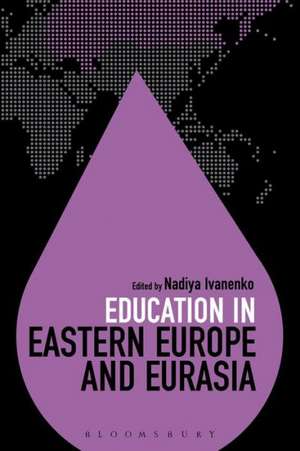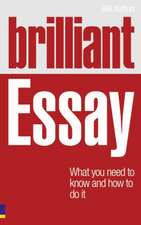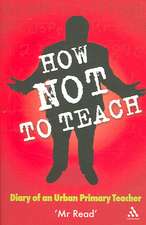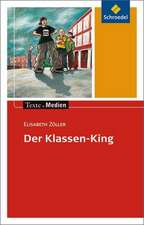Education in Eastern Europe and Eurasia: Education Around the World
Editat de Dr Nadiya Ivanenko Dr Colin Brocken Limba Engleză Hardback – 23 apr 2014
Din seria Education Around the World
- 8%
 Preț: 313.74 lei
Preț: 313.74 lei - 8%
 Preț: 315.17 lei
Preț: 315.17 lei - 8%
 Preț: 315.17 lei
Preț: 315.17 lei - 7%
 Preț: 320.85 lei
Preț: 320.85 lei - 7%
 Preț: 320.85 lei
Preț: 320.85 lei - 18%
 Preț: 315.33 lei
Preț: 315.33 lei - 18%
 Preț: 315.17 lei
Preț: 315.17 lei - 13%
 Preț: 256.12 lei
Preț: 256.12 lei - 13%
 Preț: 316.11 lei
Preț: 316.11 lei - 8%
 Preț: 319.44 lei
Preț: 319.44 lei - 8%
 Preț: 316.11 lei
Preț: 316.11 lei - 8%
 Preț: 315.17 lei
Preț: 315.17 lei - 8%
 Preț: 316.11 lei
Preț: 316.11 lei - 37%
 Preț: 187.87 lei
Preț: 187.87 lei - 43%
 Preț: 631.21 lei
Preț: 631.21 lei - 43%
 Preț: 727.31 lei
Preț: 727.31 lei - 43%
 Preț: 631.21 lei
Preț: 631.21 lei - 44%
 Preț: 187.30 lei
Preț: 187.30 lei - 37%
 Preț: 910.69 lei
Preț: 910.69 lei - 37%
 Preț: 917.83 lei
Preț: 917.83 lei - 37%
 Preț: 912.59 lei
Preț: 912.59 lei - 37%
 Preț: 916.85 lei
Preț: 916.85 lei - 36%
 Preț: 172.36 lei
Preț: 172.36 lei - 36%
 Preț: 171.32 lei
Preț: 171.32 lei - 12%
 Preț: 234.20 lei
Preț: 234.20 lei - 8%
 Preț: 318.95 lei
Preț: 318.95 lei
Preț: 914.95 lei
Preț vechi: 1445.04 lei
-37% Nou
Puncte Express: 1372
Preț estimativ în valută:
175.13€ • 190.30$ • 147.21£
175.13€ • 190.30$ • 147.21£
Carte tipărită la comandă
Livrare economică 21 aprilie-05 mai
Preluare comenzi: 021 569.72.76
Specificații
ISBN-13: 9781623564803
ISBN-10: 1623564808
Pagini: 360
Dimensiuni: 156 x 234 x 25 mm
Greutate: 0.75 kg
Ediția:New.
Editura: Bloomsbury Publishing
Colecția Bloomsbury Academic
Seria Education Around the World
Locul publicării:London, United Kingdom
ISBN-10: 1623564808
Pagini: 360
Dimensiuni: 156 x 234 x 25 mm
Greutate: 0.75 kg
Ediția:New.
Editura: Bloomsbury Publishing
Colecția Bloomsbury Academic
Seria Education Around the World
Locul publicării:London, United Kingdom
Caracteristici
Discusses
education
development
in
individual
countries
alongside
local,
regional
and
global
contexts
Notă biografică
Nadiya
Ivanenkois
Associate
Professor
of
Comparative
Linguistics
and
Deputy
Dean
in
the
Department
of
Foreign
Languages
at
Kirovograd
State
Pedagogical
University,
Ukraine.
Cuprins
Series
Editor's
Preface,Colin
BrockIntroduction:
Educational
Change,
Transformation,
Reforms
-
a
Regional
Overview,Nadiya
Ivanenko
(Kirovograd
State
Pedagogical
University,
Ukraine)Part
I:
Eastern
Europe1.
Belarus:
Music
Education,Vadzim
Yakaniuk
(Belarus
State
Academy
of
Music,
Belarus)2.
Moldova:
Challenges
and
Opportunities,Elizabeth
Worden
(American
University
Washington
D.C.,
USA)3.
Russia:
The
Governance
of
Education,Mikhail
Lyamzin
(Moscow
State
Linguistic
University,
Russia)
4.Russia:
Distance
Learning,Alexander
Andreev
(Lomonosov
Moscow
State
University,
Russia)5.
Russia:
Music
Education,Vladimir
Orlov
(Saint
Petersburg
State
University,
Russia)6.
Turkey:
Education
and
Social
Change
-
Inquiries
into
Curriculum
Reform,Arnd-Michael
Nohl
(Helmut
Schmidt
University,
Germany)
and
Nazli
Somel,
(Helmut
Schmidt
University,
Germany)7.
Turkey:
A
Critical
Perspective
on
Educational
Leadership
and
Reform,Ozgur
Bolat
(Bahcesehir
University,
Turkey)8.
Turkey:
An
In-Depth
Exploration
of
"FATIH"
Project,Ayse
Kok
(Bogazici
University,
Turkey)9.
Ukraine:
Issues
in
Educational
History
and
Development,Margaryta
Danilko
(Kirovograd
State
Pedagogical
University,
Ukraine)10.
Ukraine:
Pedagogy
of
Freedom
as
an
Alternative
to
Traditional
Education,Alla
Rastrygina
(Kirovograd
State
Pedagogical
University,
Ukraine)Part
II:
Eurasia11.
Armenia:
Changes,
Challenges
and
Priorities,Terra
Sprague
(University
of
Bristol,
UK)
andChristina
Sargsyan
(International
Centre
for
Human
Development,
Armenia)12.
Azerbaijan:
The
Role
of
Teachers
in
Curriculum
Reform,Iveta
Silova
(Lehigh
University,
USA),
Elmina
Kazimzade
(Lehigh
University,
USA)
and
Yuliya
Karimova
(European
Azerbaijan
School,
Azerbaijan)13.
Georgia:
Marketization
and
Education
Post-1991,Maia
Chankseliani
(University
of
Oxford,
UK)14.
Israel:
Socio-Historical
Context
and
Current
Issues,Yaacov
Iram
(Bar
Ilan
University,
Israel)15.
Israel:
Holocaust
Education,Nitza
Davidovitch
(Ariel
University
Center
of
Samaria,
Israel)Index
Recenzii
Nadiya
Ivanenko's
effort
to
...
give
a
general
picture
of
the
whole
[geographical]
area
is
heroic.
This volume is a welcome addition to the comparative and international education literature. It is informative and well put together. Its authors throw fresh light on the changes and challenges facing countries in this region. Their observations, based on recent research, provide some fascinating insights and should appeal to those wanting to find out more about this part of the world.
A fascinating review and analysis of educational change in the Russian Federation and its near western and southern neighbours. Trends of internationalization, structural reform, and the move away from the socialist inspired policies of the previous Soviet Union are shown to have had some success in achieving more democratic and technically advanced systems, whilst battling the economic crises that plagued this region and much of the rest of the world.
Education in Eastern Europe and Eurasiaprovides an insightful introduction to the societal changes taking place in the post-Soviet era, and the effect on national educational systems. The book contains fifteen chapters, structured in two parts. The book is easy to read-accessible not just to researchers, but also to teachers and policy-makers who want to learn more about the educational development of the region [.] an invaluable source of information and a needed starting point for any such project, and therefore, highly recommended.
This volume is a welcome addition to the comparative and international education literature. It is informative and well put together. Its authors throw fresh light on the changes and challenges facing countries in this region. Their observations, based on recent research, provide some fascinating insights and should appeal to those wanting to find out more about this part of the world.
A fascinating review and analysis of educational change in the Russian Federation and its near western and southern neighbours. Trends of internationalization, structural reform, and the move away from the socialist inspired policies of the previous Soviet Union are shown to have had some success in achieving more democratic and technically advanced systems, whilst battling the economic crises that plagued this region and much of the rest of the world.
Education in Eastern Europe and Eurasiaprovides an insightful introduction to the societal changes taking place in the post-Soviet era, and the effect on national educational systems. The book contains fifteen chapters, structured in two parts. The book is easy to read-accessible not just to researchers, but also to teachers and policy-makers who want to learn more about the educational development of the region [.] an invaluable source of information and a needed starting point for any such project, and therefore, highly recommended.












